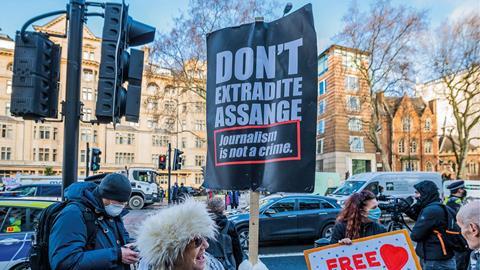When District Judge Baraitser ruled against extraditing Julian Assange to the United States this month, one of the precedents she cited was the case of Lauri Love.

Like Assange, Love had been accused by the US of compromising government computer networks. Like Assange, Love was diagnosed as suffering from Asperger’s syndrome. The High Court held that Love’s extradition would be oppressive, given that he had the ‘determination, planning and intelligence’ to take his own life in a US prison. Baraitser reached the same conclusion about Assange.
But the Love ruling, delivered in 2018, is important for another reason. It was the first time that a court had refused to grant extradition because of the so-called forum bar.
This defence, in its present form, goes back to 2012, when Theresa May was home secretary. She blocked the extradition of Gary McKinnon, another Asperger’s sufferer accused by the US of computer hacking. But, May told parliament, such decisions should be taken by judges rather than ministers. Courts would also be given the power to bar extradition on forum grounds. This, the government explained, was because of widespread concerns ‘that insufficient safeguards are currently built into cases… where two or more courts from different countries simultaneously have jurisdiction over a specific case’.
The forum bar kicks in if a substantial measure of the defendant’s relevant activity took place in the UK and extradition would not be in the interests of justice. To assess that, the court must consider where most of the loss occurred, the interests of victims and any belief by a prosecutor that the UK is not the most appropriate jurisdiction.
That point was clarified in an appeal brought later in 2018 by Stuart Scott, a banker who had worked for HSBC. The High Court blocked his extradition because of his strong connection with the UK, where most of the alleged harm took place.
In 2019, the forum bar was successfully advanced by Robert McDaid, another defendant with mental health problems. US prosecutors had accused him of calling a terrorism hotline in Maryland and falsely claiming that a man called Dobbs was threatening to kill hostages, intending that Dobbs would be ‘swatted’ by armed police.
Last month, a district judge upheld the forum bar for a fourth time – yet again blocking a US extradition request. The case involved Christopher Taylor, 58, from Wigan, who was accused of hacking into webcams in nearly 40 countries.
In 2011, the leading British technology entrepreneur Mike Lynch sold his software company Autonomy to Hewlett-Packard for $11bn. The hardware pioneer subsequently accused Autonomy of manipulating accounting information to drive up its price. HP wrote down the value of Autonomy by $8.8bn just a year later and brought a civil claim for $5.5bn against Lynch and his former chief financial officer. They denied any wrongdoing and the case was heard in the High Court from March 2019 until January 2020. Mr Justice Hildyard has spent the past year working on his judgment, which is expected soon.
Shortly before the civil case opened, though, US prosecutors accused Lynch and a senior colleague of wire fraud. Lynch was arrested in London and bailed after depositing £10m as security. High-profile supporters said in a letter to The Times last week that any British business leader at odds with a powerful US company could face the same fate. Lynch faces a week-long extradition hearing in London next month and is expected to deploy the forum bar.
‘The US Department of Justice should not have commenced extradition proceedings prior to the judgment of the English High Court,’ Lynch’s US lawyers Christopher Morvillo and Reid Weingarten said. ‘The US claims concern alleged conduct in the UK. Dr Lynch is a British citizen who ran a British company listed on the London Stock Exchange, governed by English law and UK accounting standards. This extradition request reflects yet another example of the department’s attempts to exert extraterritorial jurisdiction over non-US conduct.’
And the US response? That is implicit in the indictment: a US business was allegedly defrauded and US shareholders lost money. That makes it US conduct.
After the US-UK extradition treaty was signed in 2003, there were heated arguments over whether it was lopsided: the UK had to show ‘probable cause’ before the US would extradite a suspect but the US needed to show only ‘reasonable suspicion’. Both countries insist that there is no difference in practice between the two tests.
But look at the figures. Describing the treaty as a ‘truly dreadful deal’, the Conservative MP David Davis told the Commons a year ago that, since it took effect in 2007, the UK had sent 135 UK nationals to the US while the US had surrendered only 11 people to the UK.
It looks as if the courts are finally trying to even things up.
joshua@rozenberg.net
































5 Readers' comments